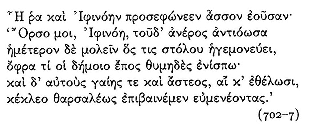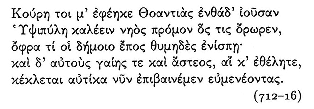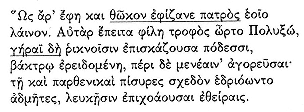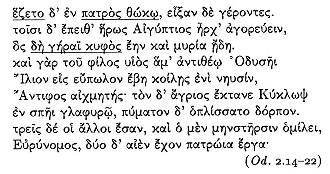A—
Arrival and Prelude to the Encounter (609–720)
The episode begins with an account of the murder of the Lemnian men (a). Apollonius fashioned this introductory material in a way that places special emphasis on the one exception to the slaughter: Hypsipyle's rescue of her father, Thoas, by setting him adrift in a chest (


All accounts of the Lemnian crime are unanimous in making Thoas the only man to escape the general slaughter of the male population of the island. But there is disagreement among the
[5] Vian's beginning of a new paragraph at 633 is confusing. In the presentation of these lines, Fränkel (OCT) and Ardizzoni more correctly, I believe, see lines 633–39 as closely connected with the introductory material; cf. Fränkel ad 1.630b–39.
[6] See Blumberg 15–16 and Vian 26–27, who argue convincingly that Aphrodite was angry with the Lemnian men, and not the women as supposed by Sad 1.609–19a, Ardizzoni ad 614, Levin 62, and, most recently, B. Pavlock, Eros, Imitation, and the Epic Tradition (Ithaca 1990) 46.
several extant versions of this story about what happened to Thoas after Hypsipyle saved him.[7] Either the Lemnian women discover and kill him (Apollodorus 3.6.4, Herodotus 4.145, hypothesis ad Pindar Nem. , p. 424 Boeckh) or he escapes from the island in a vessel of some sort (Apollonius, Val. Flac. 2.242–310, Statius Theb. 5.284–91). In the latter case, he either goes to the land of the Taurians (Val. Flac., Hyginus 120), to Sikinos (Apollonius, Xenagoras FGrHist 240 F 31; cf. Sad 1.623–26a), or to Chios (Statius). According to one version in which Thoas was discovered and killed, Hypsipyle had hidden him in a chest (



Of all the women, Hypsipyle alone spared her old father,
Thoas, who held sway over the people.
She set him adrift over the sea in a hollow chest
with the hope that he might escape.
In all likelihood, Apollonius was influenced by the story of Danaë and Perseus. Danaë's father, Acrisius, likewise set her and her infant son, Perseus, adrift in a



[7] Cf. Immisch, "Thoas (1a)," Roscher 5.803–8.
[8] Pavlock (supra n. 6) 46 sees another gender reversal in the renaming of the island Sicinus (male) from OEnoee[*] (female).

And fishermen pulled him ashore
onto an island, formerly OEnoee[*] , afterwards called Sikinos
from the Sicinus whom the naiad OEnoee[*] bore
to Thoas after the young woman went to his bed.
The question now arises: Was Hypsipyle's motive completely honorable? Fathers traditionally exposed children in chests on the sea, especially unmarried daughters discovered to be pregnant. The motive was to escape the pollution of parricide while at the same time to do away with their children.[9] Consonant with the Lemnian women's role reversal, Hypsipyle assumes here the role of a father who refuses to kill his own child but acquiesces in the inevitability of its death. In mythic accounts of such exposures it is usually sexual indiscretion and the birth of illegitimate children that occasion the abandonment to death. And it is precisely such indiscretion and illegitimacy that Hypsipyle reports as reasons for the absence of men on Lemnos when she recounts the story to Jason in the second version of the Lemnian crime (cf. 798–826). The suggestive inversion of the exposure motif at the very least brings Thoas's innocence into question. Moreover, Hypsipyle confirms her usurpation of her father's role when she dons his armor (637–38), sits on his throne (667), and offers his kingdom (827–29). As a result of the Lemnian crime, women now perform the functions of men. A daughter even appears to expose her father for his sexual encounters.
After the introductory triptych explaining the absence of the Lemnian men, Apollonius briefly depicts the panic among the Lemnian women as the Argo approaches (b). The women rush down to the shore (


In their first rush to the shore, the women are portrayed in a traditionally male role as they prepare to ward off the Argonauts; in the corresponding section, they will be seen to have reverted to their earlier female roles when Apollonius subtly suggests that they will become the mothers of the Argonauts' children.
In the third section of the first half (a ), Apollonius sets the scene for the encounter between Jason and Hypsipyle. The Argonauts send their herald, Æthalides, a son of Hermes endowed with an imperishable memory, to ask permission to stay the night. The next day, however, the opposing north winds prevent them from leaving (a , 640–52; 13 lines).[10] The women then meet in assembly. On the advice of Polyxo, they decide to invite the men into the city in the hope of reestablishing the male community. Hypsipyle thereupon instructs Iphinoë to approach the leader of the group, inviting him to speak with her in Myrine while the rest of the Argonauts have her permission to avail themselves of the island (b , 653–708). Iphinoë delivers Hypsipyle's invitation, and the Argonauts happily accept (a , 709–20; 12 lines). The embassy of Æthalides clearly corresponds with that of Iphinoë,[11] and the assembly of the Lemnian women falls in the central position between them.
In addition to the contrast between male and female in the framing elements, which parallels the format of the introductory narrative (a), Apollonius, as mentioned above, records each herald's embassy in a contrastive fashion. He does not report Æthalides' speech to Hypsipyle and the Lemnian women (

[10] PaceSad 1.652, who sees them remaining despite the blasts of the north wind; see Mooney ad 1.651–52, Vian 257 ad 652, and A. Ardizzoni, "'Trappole' e infortuni apolloniani," GIF 30 (1978) 276–78. Cf. Stössl (supra n. 1) 31ff., who sees this as one of the seams that reveals Apollonius's model, Æschylus's Hypsipyle .
hand, he has Iphinoë repeat Hypsipyle's message almost verbatim. After the assembled women decide to welcome the Argonauts into the city with the hope of luring them into their beds (cf. 695), the poet continues:

She [sc. Hypsipyle] said this and then addressed Iphinoë, who was
close at hand:
"Go quickly, Iphinoë, and ask the man
who leads this expedition to come to our home so that
I might announce to him the decision of our people, which I am
sure will
please him; and tell the others they can disembark without fear
and
come into the city, if they so desire and their intentions are
friendly."
Iphinoë's embassy provides one of the few instances in which Apollonius repeats several lines of text.[13] Iphinoë gives a close, but not perfect, rendition of Hypsipyle's message:

[13] See G. W. Elderkin, "Repetitions in the Argonautica of Apollonius," AJP 34 (1913) 198–201.
Hypsipyle, the daughter of Thoas, has ordered me to come here
to summon the captain of the ship, whoever he is, so that she
might announce to him the decision of our people, which she is
sure will
please him; and to tell you others to disembark right now and
come into the city, if you so desire and your intentions are friendly.
The female herald, whose name implies strength or force of mind, slightly edits her message, unlike, it would seem, her male counterpart in the first embassy. In place of



Hypsipyle opens the assembly, which these two contrasting embassies frame in the center of the subsection (b ), by inviting a discussion on the problem of what to do with the Argonauts, who are as yet unaware of the situation on Lemnos. After suggesting that they keep them away from the city by giving them supplies for their journey, she concludes by inviting other suggestions:[15]

If any other among you can come up with a better idea ,
let her stand up; for this reason I summoned you here.
The scholiast ad 1.665 noted that Hypsipyle's openness to other proposals was modeled after a similar request made by Agamemnon in the Iliad :[16]
[14] Fränkel ad 1.709–20 (cf. also p. 98 n. 188) suggests that the repetition serves Hypsipyle's ruse; she did not want Jason to know too much, but wanted to give him her own explanation for the absence of the men. E. George, "Poet and Characters in Apollonius Rhodius' Lemnian Episode," Hermes 100 (1972) 57, argues that Apollonius wanted to underscore the nervousness of the Lemnian women in their invitation by having Iphinoë slightly confuse the message.

I wish someone would now come up with a better idea than this,
either young or old. This would please me.
When Agamemnon invited anyone, young or old, to suggest a plan in the wake of their defeat at the hands of Hector, Diomedes, first excusing his youthfulness (ibid. 110–27), advised immediate action. Polyxo similarly calls for immediate action in the case of the unexpected arrival of the Argonauts (693–96). Not only does Hypsipyle's elderly nurse contrast with Diomedes in gender and age, but even in the nature of her advice; she speaks of surrendering themselves and their homes to the Argonauts, while Diomedes advocates a more aggressive approach in their war against the Trojans. The change of advice from an immediate attack in the battlefield to immediate submission in bed is as striking as it is suggestive of the importance that love will play in the present episode and in the epic in general.
The inversion of this Iliadic model parallels the adaptation of an Odyssean text that immediately follows. Once Hypsipyle sits down on her father's throne after her brief address to the assembly, the elderly Polyxo rises to speak, surrounded by four aging maidens:[17]


Thus she spoke, and she sat down on her father's seat
of stone. Then Polyxo, her beloved nurse, arose,
moving haltingly on legs twisted from age and
leaning on her cane; she was most eager to address the assembly.
Alongside her sat four young women,
unmarried girls whose hair was beginning to turn gray.
She stood in the middle of the assembly and could barely hold
her neck up, her back was so badly crippled . She said the
following.
The scholiast ad 1.669 was the first to observe that Apollonius had a specific Homeric passage in mind, in this case from the second book of the Odyssey :[18]

He [sc. Telemachus] sat down on his father's throne and the elders
yielded.
The hero Ægyptus was the first to speak among them,
a man who was crippled from age and knew countless things.
For his own dear son went together with godlike Odysseus
to horse-rich Ilion in the hollow ships,
the warrior Antiphus. The savage Cyclops killed him
in his cavernous home, the one whom he ate last.
Yet there were three other sons, and one associated with the
suitors,
Eurynomus, while the other two stayed on their father's farm.
In the Homeric passage, Telemachus called the first assembly held in Ithaca since the departure of Odysseus for Troy twenty years earlier. As Telemachus sits on his father's throne, the aged Ægyptus, who was the father of four sons, asks the reason for the assembly. He imagines that there must be the threat of an invading army (ibid. 25–34).[19] Here we can observe several points of contact with the Argonautic text:
• Hypsipyle, the daughter of the king, calls an assembly just as does Telemachus, the son of Ithaca's king, Odysseus.
• Both Telemachus and Hypsipyle are portrayed as seated on their fathers' thrones.
• The aged Polyxo is the female counterpart of the aged Ægyptus.
• The four maidens with Polyxo parallel the four sons of Ægyptus.
• Invading armies are the apparent concern of both assemblies.
Moreover, both assemblies take up the issue of prospective marriages: the Lemnian women debate marriage with the Argonauts, while in the Ithacan assembly, marriage with Penelope lies at the heart of the problem for which the people were convened. In both this and in the previous Iliadic reference, Apollonius contrasts the Lemnian women with Homeric males, a contrast that reflects the gender opposition of the surrounding frame (Æthalides-Iphinoë).
By counterposing Lemnian and Argonautic men with Lemnian women in the structure of the subsections, and by inverting the gender of the exposure motif and the Homeric models, Apollonius pits male against female in the first half of the episode. The gender antithesis neatly reflects the role reversal of the Lemnian women, which lies at the heart of the story. These armed warriors, highlighted at the center of the first half, will threaten the continuation of the Argonautic mission. As will become clear in the second half of the episode, the poet will imply through allusion to well-known Homeric texts that the Argonauts are in danger of becoming less than men because of their association with the masculine women of Lemnos.
[19] Cf. W. B. Stanford, The Odyssey of Homer (London 1950) vol. 1 ad 2.30.